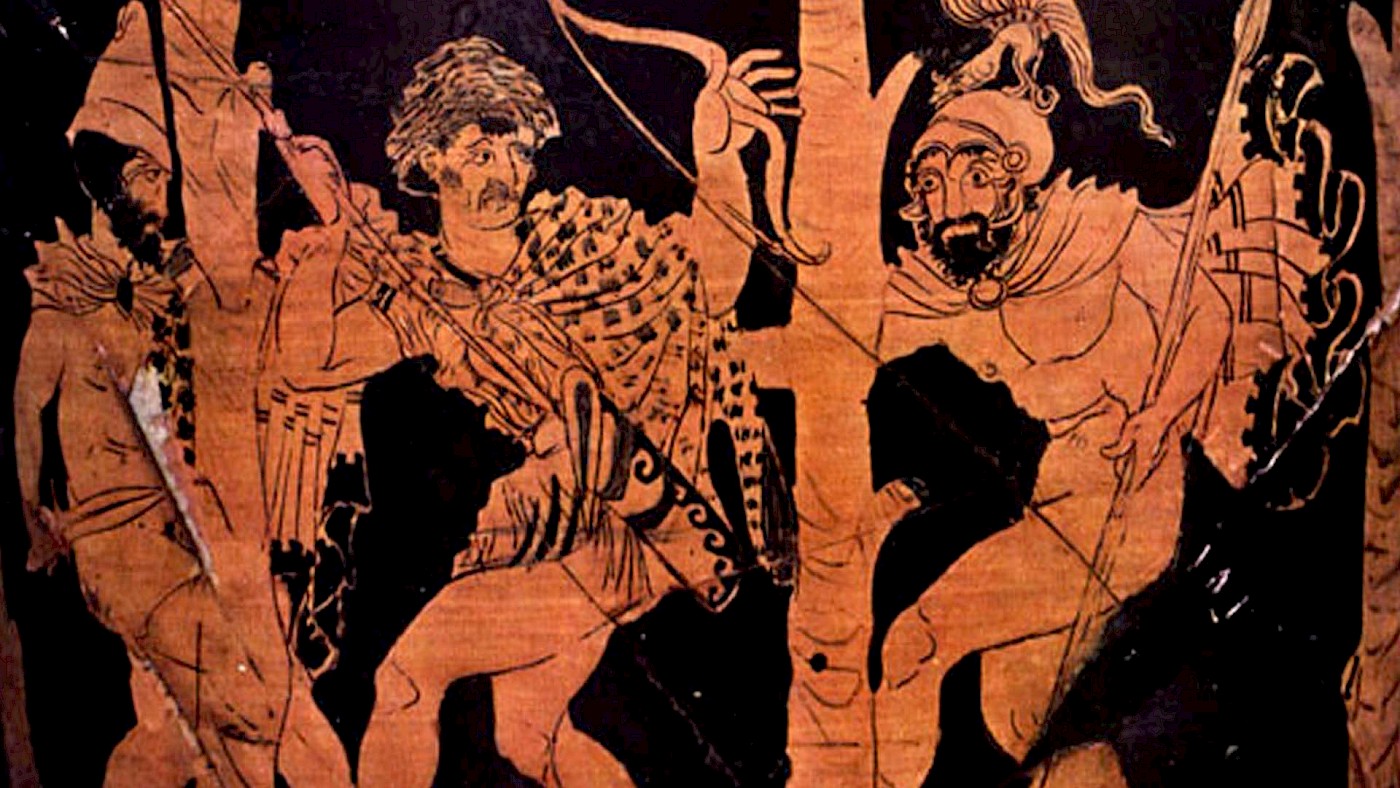The tenth book of the Iliad is commonly referred to as the Doloneia, named after the Trojan spy Dolon, who will be discussed further below. Curiously, nothing that happens in this book is of any consequence in the later story, and it can indeed be removed completely without losing much of the story. Already in ancient times, some scholars argued that it was originally a separate if popular composition that was at one point inserted into the Iliad.
Some modern scholars have followed suit, arguing that the style and perhaps even the turns of phrase employed by the poet in this book are different from those of the rest of the Iliad, and are perhaps closer to the language of the Odyssey. There’s a useful rundown of the complexities of this issue in Malcolm M. Wilcock’s A Companion to the Iliad, Based on the Translation by Richmond Lattimore (1976), pp. 113–115. See also Dué and Ebbott’s commentary on Iliad 10 (with thanks to contributor Matthew Lloyd).
A reconnaissance mission
The book starts with Agamemnon, the commander-in-chief of all the Greeks, being unable to sleep. Menelaos, his brother, is also restless. He goes to Agamemnon and asks what he has planned, saying openly that they will find no one willing to spy on the Trojans, since “Such a man will have to be very bold-hearted” (Il. 10.41). Agamemnon tells Menelaos that they need to gather some of the other leaders and converse about what to do.
Eventually they gather virtually all of the leaders of note. Nestor, the eldest of all the kings, asks if there is “no man who, trusting in the daring of his own heart, would go among the high-hearted Trojans?” (Il. 10.204–205). Diomedes, the young king of Argos and a major character in the Iliad, immediately volunteers to go and spy on the Trojans. Other heroes leap at the chance to join him. Diomedes picks Odysseus, “whose heart and proud spirit are beyond all others” (Il. 10.243–244).

They then head off to arm themselves. The heroes forego bronze armour (which would be shiny and glimmer in the moonlight), with Odysseus even donning a rather curious helmet, made of leather and covered with the tusks of boars. Such helmets are indeed known from the Late Bronze Age, when they were commonly used. The description in lines 261–265 perfectly match this Mycenaean piece of headgear.
Some have argued that the helmet is perhaps a genuine relic of an earlier Mycenaean version of the story of the Trojan War. Others, however, have pointed out that most of the weapons and other equipment described by Homer seem to date more plausibly to the poet’s own time (ca. 700 BC), and that the description of this helmet is perhaps based on an heirloom of some sort, or a specimen unearthed from a Mycenaean tomb in his own age.
An encounter in the night
Diomedes and Odysseus leave the Greek camp. Meanwhile, among the Trojans, the champion Hector is asking for volunteers to go and spy on the Greeks. A Trojan by the name of Dolon volunteers to go, whom Homer describes as “an evil man to look on, but swift-footed” (Il. 10.316). Unfortunately for Dolon, Odysseus sees him coming towards the Greek camp. They rise to catch him and a short chase follows. Diomedes throws his spear ahead of Dolon and the Trojan surrenders in fear.
It is here that Odysseus shows himself to be at his most duplicitous. He tells Dolon (Il. 10.383–389):
Do not fear, and let no thought of death be upon you. But come, tell me this thing and recite it to me accurately: where is it that you walk alone to the ships from the army through the darkness of night when other mortals are sleeping? Is it to strip some of the perished corpses, or is it that Hector sent you out to spy with care upon each thing beside our hollow ships? Or did your own spirit drive you?
Dolon is shaking in fear. He tells them that it was Hector’s idea to go. Then something strange happens: Odysseus smiles. Nowhere else in the Iliad does he smile. His smile becomes sinister when you realize that at this point, Dolon’s fate had already been sealed. Corinne Ondine Pache has written an interesting article about Odysseus’ general attitude at Troy that I recommend you check out: “War games: Odysseus at Troy”, published in Harvard Studies in Classical Philology (2000) 100, pp. 15–23.
In any event, Odysseus interrogates Dolon and the hapless Trojan willingly provides answers to the best of his ability. Among the information he reveals is that Thracians have recently arrived, led by King Rhesus, whose horses are said to be finest horses Dolon ever clapped eyes on. Dolon then asked to be taken hostage, but Diomedes answers grimly that this will not happen. Dolon reaches out in a sign of supplication, but Diomedes ruthlessly beheads him: “Dolon’s head still speaking dropped in the dust” (Il. 10.457).
Seeing an opportunity to gain glory, the remainder of book 10 consists of Diomedes and Odysseus sneaking into the Thracians’ camp. Odysseus unties the fabled horses mentioned by Dolon while Diomedes, infused with strength by the goddess Athena (Il. 10.482), starts murdering the sleeping Thracians. He kills twelve men before turning his blade on the king, making him his thirteenth victim. They leave the chariot behind and jump on the horses, riding them back to camp before the alarm could be raised.
While perhaps not able to gain a lot of valuable intel, Diomedes and Odysseus were at least able to deal a heavy blow to the Thracians by slaying their king. At the same time, they also managed to enrich themselves and enhance their status among the Greeks.
